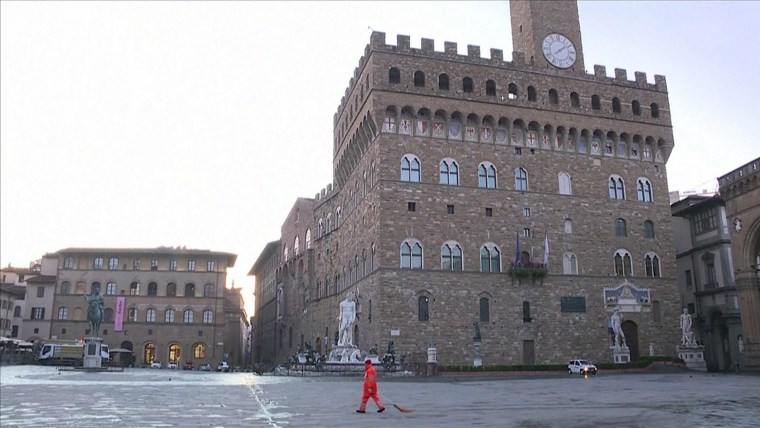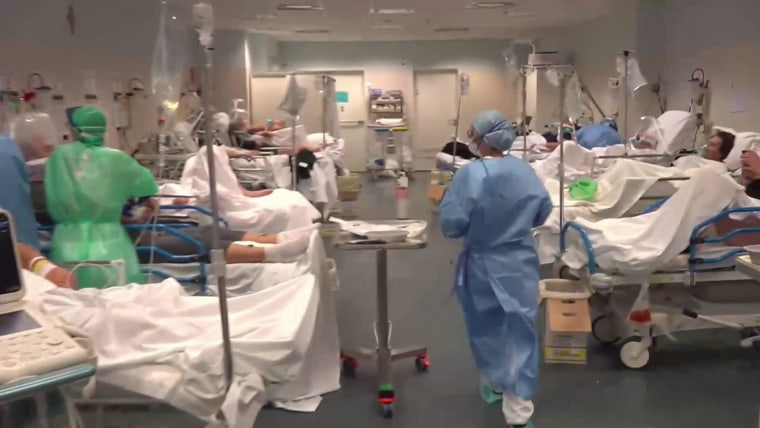ROME — “Chiuso.” Italy is closed.
Usually a trip to Rome is a dream assignment. But not when your flight lands and you learn that the prime minister has just declared all of Italy a “Zona Rosa,” or a red zone.
The minute we touched down last week, camera operator Angela Neil and I received alerts on our phones announcing that the rules that had been in place for northern Italy were now the law of the entire land: Only leave your house for essential business; restaurants must close at 6 p.m.; all public gatherings are canceled.
The first sign that things were going to be different on this trip came when we passed through a completely empty customs hall after having our body temperatures checked by security staff wearing masks and gloves.
When correspondent Matt Bradley arrived from Philadelphia the following morning, the crew on his American Airlines flight handed him a couple of bottles of water as he exited the plane. “Nothing is open in the airport,” he was told. “You’re going to need this.”
March 8 was our first full day on the ground. It felt more like a quiet public holiday than a nation under an unprecedented lockdown.
As we set up our camera position outside Rome’s Colosseum for a live report on TODAY, there was a steady stream of people walking around. Some were locals out jogging on the normally clogged streets. There were still plenty of foreign tourists taking in the sights, too. Tour buses were running. Only a few of the passengers were wearing masks.
At a nearby outdoor café, we chatted with a British couple here on vacation. They joked that they had the whole city to themselves. Our waiter was wearing surgical gloves and made everyone sit at least three feet apart. But if you could look past that, it felt like any other warm spring day in Rome.
Let our news meet your inbox. The news and stories that matters, delivered weekday mornings.
That lunch would be our last, and only, meal out. From then on, things changed rapidly.
On March 9, we interviewed a restaurant owner as he closed his two locations at 6 p.m., the new curfew deadline. He lamented that he had only made about $200 that day and was worried he wouldn’t be able to stay afloat if these circumstances kept up.
Just a few hours later, Italian Prime Minister Giuseppe Conte made another announcement. Reduced hours were no longer enough. Starting the following day, all businesses — including restaurants — would be shut down except for groceries, pharmacies and banks.
The change in the atmosphere was dramatic.
The next day, we spent the morning and the afternoon doing live reports for TODAY and MSNBC at the base of the iconic Spanish Steps, usually one of the most crowded tourist spots in Rome.
But now, the police were confronting anyone who stopped for more than a moment.
Tourists were told to go back to their hotels. Locals who paused to look at the completely empty steps — something they had maybe never seen before in their lifetimes — were told to get off the streets. Many got angry and argued with the police. More than a few were fined.
We watched as one man stopped his scooter and took a picture with his phone. Immediately, the police were on him.
With his classic Vespa scooter, helmet in the colors of the Italian flag and a scarf tossed around his neck, Andrea Misseri was the very image of everything Rome. But on that day, he was breaking the law just by stepping foot on his own streets.
“It’s a bit ugly,” he told us after the police let him go. “I’m not going to pay this fine forever, until I die.”
In our case, we have permits verifying that we are working journalists, allowing us to move around the city. But the police are still vigilant and constantly remind our team to stand 3 feet apart from one another at all times.
Their reminders are welcome. In addition to keeping a safe distance from one another, we have established ground rules for how we gather news.
We do all of our interviews outdoors, and we do not physically place microphones on the people we speak to. Instead we use what is called a boom mic — a microphone on a telescoping pole that allows you to stand far back from the interview subject. Any interviews with medical workers are done remotely over Skype or FaceTime. It is as much for their protection as for ours.
And we wash our hands all the time.
Despite the crackdown, some people still manage to get away with being outside.
There were the two young butcher shop workers who took a break to toss a football in the empty square in front of the Pantheon, laughing at the absurdity of it all.
There was the man who danced the entire length of Via della Conciliazione, the grand street leading up to St. Peter’s Square, listening to music on his headphones and singing out loud, channeling a joy that seemed so far away from this silent city.
We are constantly trying to remind ourselves what a historic moment this is. Matt and I have been to Rome before, but it’s Angela’s first time. She had planned a vacation for this summer road-tripping through Italy. “I guess that’s not happening,” she joked. Instead, she’s seen a Rome few outsiders will ever know.
“It feels like one of those old towns in the hills of Spain,” she said. “It’s beautiful and there’s no one around. I can’t imagine it being this fast-paced city.”













